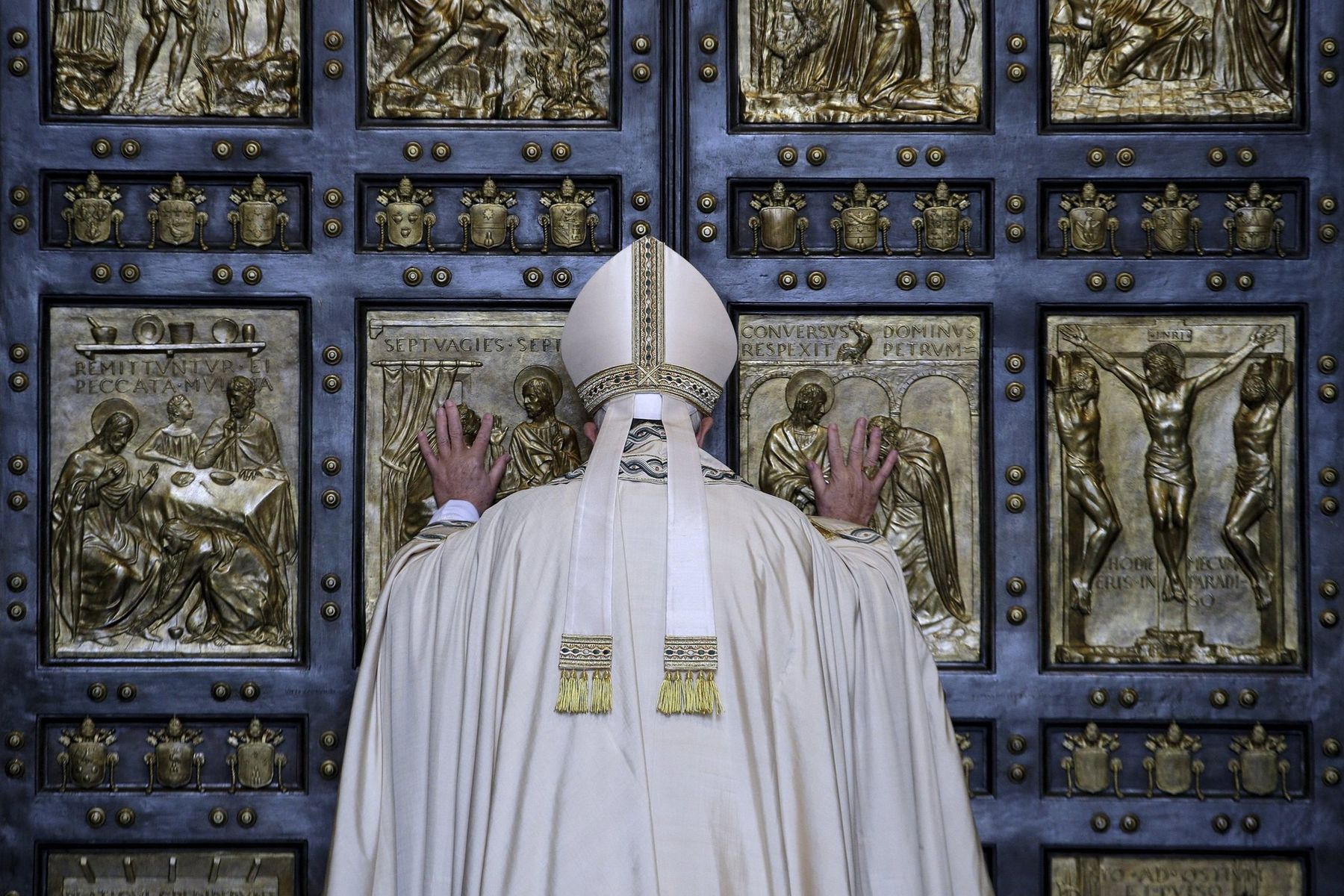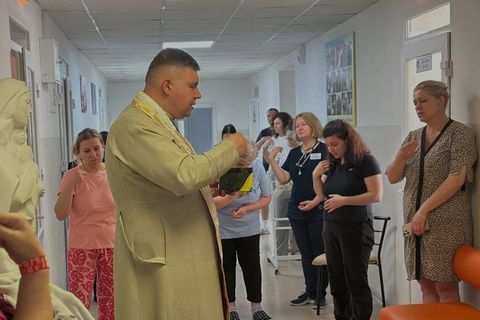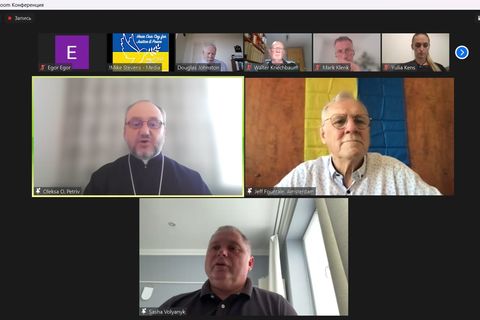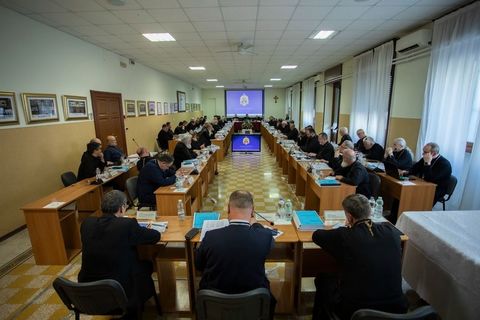
A Brief Overview of the Jubilee Year
This article explores the origin of the jubilee year tradition, its significance in the Christian East, the participation of the Ukrainian Greek Catholic Church (UGCC) in the upcoming Jubilee Year 2025, and the anticipated spiritual fruits of this celebration.
The Origin of the Jubilee Year Tradition
The custom of celebrating jubilee years originates in the Old Testament. Every 50 years, a holy year was proclaimed with the sounding of a horn: “Consecrate the fiftieth year and proclaim liberty throughout the land to all its inhabitants. It shall be a jubilee for you…” (Leviticus 25:10–11). This year was announced by the prolonged sound of a ram’s horn, known in Hebrew as “yovel,” from which the term “jubilee” is derived.
In the Roman Catholic Church, the tradition was formalized by Pope Boniface VIII in 1300. It is thought to have been inspired by the Crusaders’ fulfillment of their long-standing dream to reclaim the Holy Land for Christianity in 1291. Through the jubilee, Rome symbolically became the new Jerusalem, assuming a central role in the spiritual life of the Church.
An earlier event, the “Centennial Indulgence,” may have laid the groundwork for the Jubilee of 1300, although no documentation from the 12th or 13th centuries has survived to confirm this. According to legend, on December 24, 1299, large numbers of pilgrims traveled to Rome seeking the “Full Absolution” offered at the beginning of the new century. Cardinal Iacopi Caetani Stefaneschi (1260–1341) later recounted the 1300 Jubilee in his memoir, De centesimo sive Jubileo anno liber. He described a 107-year-old man who told Pope Boniface that, as a child, he and his father had received the “Centennial Indulgence” from Pope Innocent III in 1200.
Pope Boniface VIII officially established the jubilee in the bull Antiquorum Habet Fida Relatio (February 22, 1300). The bull stipulated that Roman residents were required to visit the basilicas of St. Peter and St. Paul 30 times during the jubilee year to receive full absolution, while pilgrims from outside Rome needed to visit 15 times. The emphasis on these two basilicas underscored the authority of the apostles Peter and Paul. The bull declared that those who “reverently visit these basilicas, truly repentant and confessed,” would receive “most complete forgiveness of their sins.” This redefined the jubilee year, shifting its focus from the Old Testament’s themes of liberation and restoration to a renewal of one’s relationship with God.
Dante Alighieri, the renowned Italian poet, recorded the influx of pilgrims during the 1300 Jubilee in his Inferno (XVIII 28–33), part of the Divine Comedy. He likened their movement through Rome to the flow of the damned crossing a bridge near the Castle of the Holy Angel.
Pope Boniface VIII initially decreed that jubilees be celebrated every 100 years. However, this interval was later adjusted. In 1350, Pope Clement VI reduced the interval to 50 years to align with the biblical jubilee cycle. Pope Urban VI further shortened it to 33 years to reflect Christ’s earthly lifespan, and Pope Paul II later reduced it to 25 years.
Over time, the Church also proclaimed “extraordinary jubilee years” outside the regular schedule.
The Jubilee Year 2025
To date, the Church has celebrated 26 ordinary jubilee years (though the jubilees of 1800 and 1875 were not observed due to historical circumstances) and 10 extraordinary jubilees. The upcoming Jubilee of 2025 will mark the 27th ordinary jubilee, adhering to the 25-year interval.
In announcing the Jubilee Year 2025, Pope Francis emphasized its spiritual significance: “The time has come for a new Jubilee, when we open the Holy Door wide again to offer a living experience of God’s love that awakens in the heart the true hope of salvation in Christ. At the same time, this Holy Year will pave the way for another fundamental anniversary for all Christians: in 2033, we will celebrate two thousand years of redemption, realized through the passion, death, and resurrection of the Lord Jesus. Thus, we stand on a path made up of great stages, in which God’s grace guides and accompanies people who walk, diligent in faith, laborious in charity, and enduring in hope (see 1 Thessalonians 1:3)” (Bull Spes non confundit, n. 6).
The Jubilee Year and the Christian East
From a brief historical overview, it is evident that the celebration of the jubilee year, although it is rooted in the Old Testament, was finally established and reinterpreted in the Roman Catholic Church from approximately the fourteenth century. Nevertheless, in proclaiming 2025 as a jubilee year, Pope Francis invited not only the faithful of the Roman Catholic Church but also the Eastern Catholic Churches to participate in it. In particular, he wrote: “I would especially like to invite the faithful of the Eastern Churches to this pilgrimage, especially those who are already in full communion with the Successor of Peter. They, who have suffered so much, often unto death, for their fidelity to Christ and the Church, should feel especially welcome in Rome, which is a mother to them as well, which cherishes so many memories of their presence. The Catholic Church, enriched by their ancient liturgies, theology and spirituality of the Fathers, monks and theologians, wants to symbolically show them and their Orthodox brothers and sisters its hospitality at a time when they when they endure their own Way of the Cross, often forced by violence and instability to leave their homelands, their holy lands, for safer places. For them, the hope of the love of the Church, which does not abandon them but follows them wherever they go, makes the sign of the Jubilee even more powerful” (Bull Spes non confundit, n. 5).
Therefore, the Ukrainian Greek Catholic Church, as one of the 23 Eastern Churches in communion with the Roman Apostolic See, responded to the call of Pope Francis to celebrate the year 2025 as a Jubilee year. In his message for the Jubilee Year 2025, His Beatitude Sviatoslav, the Father and Head of the UGCC, specifically mentions: “Although the jubilee year was established for the Israeli people, its principles were adopted by the Church, because they are of universal importance and should be relevant to modern society. Therefore, the year of jubilee, in which the Lord offers His faithful people special gifts of His grace, should be regarded as a valuable opportunity for deepened prayer and renewal, in the light of God’s word, in our relationship with God, our neighbors, and all creation. A special gift of God this year should be the renewal of hope in the hearts of every believer and our nation. According to the Apostle Paul: “For everything that was written in the past was written to teach us, so that through the endurance taught in the Scriptures and the encouragement. (Romans 15:4).
UGCC and the celebration of the Jubilee Year 2025
Since the celebration of the jubilee year is primarily a tradition of the Roman Catholic Church, the Eastern Catholic Churches, when celebrating it, do so in accordance with the peculiarities of their own church tradition, because they have the right and duty to glorify the Lord God in their own rite, according to the prescriptions of the liturgical books of their own Church of their own law. To preserve one’s own rite means to be faithful to one’s own tradition, that is, to theology, worship, church discipline, and one’s own spiritual heritage (see LG, 23; UR, 14–17; OE; can. 28 of the CCEO), avoiding “the acquisition of ways of thinking, spirituality, and piety that are not in harmony with their own spiritual heritage” (Instruction of the Congregation for the Oriental Churches on the Application of the Liturgical Prescriptions of the CCEO, 10).
Therefore, to ensure that the faithful of the Ukrainian Greek Catholic Church properly celebrate the Jubilee Year 2025 in the spirit of their own church heritage, the Synod of Bishops established a Jubilee Committee (see Resolutions No. 12–14, Zarvanytsia, July 2–12, 2024), which elaborated a plan of activities at the church-wide, diocesan and parish levels in Ukraine and in the diaspora. This will help our faithful to experience the Jubilee Year of God 2025 in a more profound way.
The central event of the 2025 Jubilee for the faithful of the UGCC is the Hierarchical Divine Liturgy in Rome on June 28, 2025, which will be presided over by His Beatitude Sviatoslav, the Head and Father of the UGCC, with the participation of the UGCC Synod of Bishops, clergy, consecrated persons and laity from around the globe. Apart from the pilgrimage to Rome, which has long been considered the center of the jubilee year, the papal bull Spes non confundit (“Hope does not disappoint”) encourages the faithful to undertake pilgrimages to other shrines. In light of this, and considering the Russian military aggression against Ukraine, which hinders many of the faithful of our Church from participating in the celebrations in Rome, we have planned the establishment of jubilee pilgrimage shrines in Ukraine, including cathedral and procathedral churches.
Spiritual fruits of the Jubilee year 2025
During the jubilee year, the Church offers opportunities for reconciliation aimed at strengthening and reviving faith. The primary goal of all these events is spiritual renewal and fortifying the Church as the Body of Christ. It is also a time for intense prayer and the deepening of personal relationships with God. The jubilee year presents a unique chance to begin a new chapter in life, free from past sins. Additionally, it serves as a special occasion for acts of mercy, both corporal and spiritual: increasing assistance to those in need, supporting orphans, the poor, and the homeless. It is also an opportunity for pilgrimages to jubilee shrines—spiritual journeys for reflection, prayer, and the strengthening of faith. Pilgrims visiting Rome or other jubilee shrines designated by the Church are invited to encounter the unique grace and mercy of God through the Sacraments of Confession and the Eucharist.
The year 2025 is particularly significant for all Christians, as it marks the 1700th anniversary of the First Ecumenical Council. This council was the first time the Christian bishops of the undivided Church convened to defend their faith in Christ against attempts to distort it through worldly wisdom. It was then that the ‘Creed’ was formulated—the enduring standard of correct theological thinking by which Christians have measured their faith and conduct for centuries. Through the stormy waves of trials and challenges presented by “this world,” Christians have navigated in the safe vessel of the Church of Christ: “the Son of God, who is one with the Father” and “co-existent with the Holy Spirit.” Christ, who declared, “I am the door. Whoever enters through me will be saved. He will go in and out and find pasture” (John 10:9).
Recognizing the biblical and theological significance of this anniversary, the faithful of the UGCC are called to celebrate the Jubilee of 2025 by embracing the treasures of their own millennial church heritage. They are reminded that this is, above all, “a favorable time” (cf. 2 Cor. 6:2) for conversion and spiritual growth. This journey of renewal leads to a deeper realization that the Lord is the sovereign ruler of the world and of human life.
Organizing Committee of the Jubilee Year 2025,Photo credit: Reuters / Max Rossi



